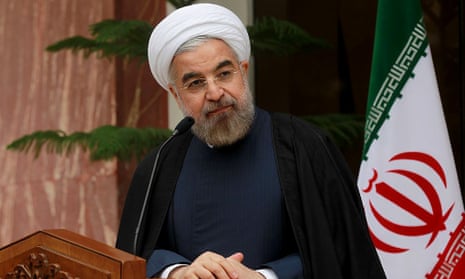Iran defended its nomination for ambassador to the United Nations on Tuesday, after hawks in the US Senate passed legislation to ban the official from entering the country over his alleged role in the 1979 hostage crisis.
The dispute over Hamid Aboutalebi, Tehran’s pick as its envoy to the UN in New York, threatens to derail talks over Iran’s nuclear program, which are entering a critical phase in Vienna.
Aboutalebi, a close political adviser to the Iranian president Hassan Rouhani, has served as Iran's ambassador to Belgium, Italy, Australia and the European Union. He has denied direct participation in the seizure of the America’s embassy in Tehran more than three decades ago, which resulted in 52 Americans being held hostage for 444 days. He has reportedly insisted that his involvement in the group Muslim Students Following the Imam's Line, which occupied the embassy, was limited to translation and negotiation.
However, senior US lawmakers who accuse Aboutalebi of involvement in the siege are rallying round legislation to prevent him access to UN headquarters.
On Tuesday, in the wake of the Senate's endorsement of a bill that effectively targeted Aboutalebi, and as a new round of nuclear negotiations was getting under way in Vienna, Iran stood by its nomination.
“In our viewpoint, the ambassador who has been introduced is qualified for the position and has had important diplomatic posts in European countries and Australia, and has had a good, effective and positive performance during his past [diplomatic] missions,” Iranian foreign ministry spokeswoman Marzieh Afkham told reporters, according to state TV.
Legislation authored by Republican senator Ted Cruz easily passed the Senate on Monday, after it received the backing of Democratic hawks such as Chuck Schumer. Cruz, a standard-bearer of the right wing of the GOP, called Iran’s nomination a “deliberate and unambiguous insult to the United States”.
“Given the larger strategic threats to the United States and our allies, represented by Iran’s nuclear ambitions, this is not the moment for diplomatic niceties,” Cruz said. If put to the vote in the House, the bill is likely be supported by in the second chamber, however any visa ban on Aboutalebi would require the executive branch.
The White House appeared to harden it stance on Tuesday in the wake of the Senate vote.
Press secretary Jay Carney said: "We’ve informed the government of Iran that this potential selection is not viable". The language was the closest the administration has come to ruling out Aboutalebi being allowed into the country to fulfil a UN role.
The Obama administration has described Aboutalebi’s appointment as “extremely troubling”, but has so far stopped short of saying he should be barred from the US. Protocol dictates that the US accept UN diplomatic staff and foreign leaders, even from its adversaries, although Washington insists there are exceptions to the rule.
The controversy comes at a critical juncture of the nuclear negotiations, which are resuming between Iran and six world powers, led by the US. On the eve of the talks, scheduled for Tuesday and Wednesday, Iranian foreign minister Mohamad Javad Zarif said negotiators would specifically address the text of an agreement – a task he called “the difficult part” of discussions.
In previous rounds of talks, which are taking place against the backdrop of an interim agreement under which Iran froze some nuclear enrichment operations in return for limited sanctions relief, negotiators have held back from debating any specific text.
“Probably at the beginning of preparing the draft, the differences will be lots,” Zarif told Iran's state-run television.
The US has given a slightly different timeframe. A senior administration official involved in the talks, who spoke to reporters on condition of anonymity, said that drafting actual text was not due to begin until May, with all sides until then involved in clarifying technical issues. The official compared the talks to a Rubik’s cube, “where [making] progress on one element may mean there’s more trade space on another element”.
Both sides are under pressure from hardliners in Tehran and Washington, who are deeply sceptical the talks will yield a satisfactory deal. The clock is ticking, with both sides committed to achieving a comprehensive deal by 20 July.
Desperate to seize what it believes is a unique window for an agreement, the White House dissuaded critics in the Senate from introducing a bill that would impose new sanctions against Iran, a move it said could sabotage the talks. But has been unable to defuse the growing row over Aboutalebi's appointment.
Administration officials are angry Rouhani heightened tensions by appointing Aboutalebi, but also anxious the controversy does not escalate in Washington and undermine support for negotiations.
The dispute over Aboutalebi's appointment has been widely reported in the Iranian media, too. Iran considers its UN ambassador a prominent figure, often appearing on foreign-based TV channels representing the views of the Islamic republic.
The 1979 hostage crisis remains a fraught memory for both Iran and the US. Young Iranians involved in the seizure of the embassy, and American diplomats held hostage, have gone on to hold senior positions in their respective governments.
There were conflicting reports from Tehran and Washington about diplomatic discussions over Aboutalebi’s nomination. Last week Marie Harf, deputy press secretary for the State Department, was non-committal over whether Aboutalebi would receive a visa. She added: “We’ve raised our serious concerns about this possible nomination with the government of Iran. I’m not going to get into specifically how we’ve done that, but we have done that.”
That account was disputed in Tehran on Tuesday by Afkham, who indicated Iran has still not heard formally from Washington. "We think the process is running its diplomatic course and until we receive a formal response from official channels, we do not consider the matter finished," she said.





Comments (…)
Sign in or create your Guardian account to join the discussion